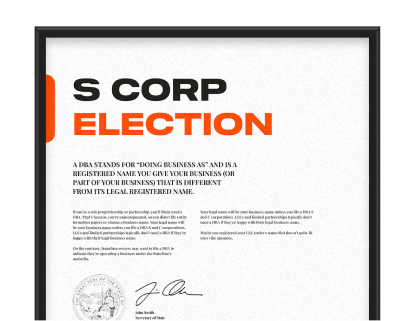On this page
Business Taxes
How Your LLC Will Be Taxed
In this guide, we’ll cover the main business taxes required in North Carolina, including payroll, self-employment and federal taxes. Profits from an LLC aren’t taxed at the business level like C Corporations. Instead, they're taxed as follows:
- Owners pay self-employment tax on business profits.
- Owners pay state income tax on any profits, minus state allowances or deductions.
- Owners pay federal income tax on any profits, minus federal allowances or deductions.
- Employers pay payroll tax on any wages they pay to employees.
- Employees pay state and federal taxes on their earnings.
Items 1, 2 and 3 fall under pass-through taxation for any LLC owners, managers or members who receive profits from the business. Profits are reported on federal and state personal tax returns.
Looking for Someone to Do Your Company’s Taxes?
Get Help with Taxes
State Taxes for LLCs
There are two main types of tax you'll be required to pay to the NC Department of Revenue: income and sales. You may also need to pay franchise tax under certain circumstances.
North Carolina Income Tax
As a business owner, you’ll need to pay state income tax on any money you pay to yourself. These earnings flow through to your personal tax return. You’ll be taxed at the state's standard rate, and you’ll be able to apply regular allowances and deductions.
Your employees will also need to pay North Carolina income tax.
The North Carolina income tax rate is 5.25%, though this may change from year to year, so check with your accountant or tax preparer to ensure you pay the correct amount.
NC Sales and Use Tax
Sales tax is collected at the point of purchase when you sell physical products or certain types of services. The amount may vary depending on the region, county or city where your business is located. Depending on the type of business you have, you may be required to collect sales tax on behalf of the North Carolina Department of Revenue.
You'll typically need to collect North Carolina sales tax on:
- Tangible, personal property and goods you sell, such as furniture, cars, electronics, appliances, books, raw materials, etc.
- Certain services your business might provide
Most states don’t levy sales tax on food, medications, clothing, gas and other necessities.
The North Carolina sales tax rate is 4.75 percent, but the total tax may be higher depending on additional sales tax levied by individual municipalities. Check with the North Carolina Dept of Revenue to confirm whether your business is required to collect sales tax, and how much you must pay.
While several states impose a use tax if you purchase physical products outside the state for use in that state, NC use tax rules are slightly more complicated:
"North Carolina use tax is due by individuals and businesses on tangible personal property purchased, leased or rented inside or outside this State for storage, use, or consumption in North Carolina pursuant to N.C. Gen. Stat. § 105-164.6 N.C. Gen. Stat. § 105-164.6. Use tax is also due on taxable services sourced to North Carolina and certain digital property purchased inside or outside this State for storage, use, or consumption in North Carolina. Individuals and businesses must pay use tax to the Department when retailers, remote sellers, or facilitators do not collect sales or use tax on taxable transactions."
Use our sales tax calculator to get an idea of how much you'll need to pay, and check with your accountant and the Department of Revenue to confirm whether your business is required to collect North Carolina sales tax and, and consult with your accountant or professional tax preparer to ensure you're paying the necessary taxes in the correct amounts.
North Carolina Franchise Tax
Some states — including North Carolina — levy a tax on certain businesses for the right to exist as a legal entity and do business in the state. This is usually called a franchise tax, transaction tax or privilege tax. Despite its name, this is not a tax on franchises. It is an essential part of filing taxes for your LLC.
The North Carolina franchise tax applies to all C Corporations in the state. It also applies to LLCs under certain circumstances:
"If an LLC is treated as a C Corporation for federal tax purposes and a corporate member has activities in this State in addition to its ownership interest in the LLC, the corporate member(s) is required to file a corporate income and franchise tax return."
Talk to your accountant or tax preparer, or contact the NC Department of Revenue to determine whether you're required to pay the franchise tax and to ensure you're paying the correct amount.
Federal Taxes for LLCs
There are a couple of different federal taxes that every LLC will need to pay, including North Carolina LLCs. These are self-employment tax and federal income tax, which are taxed as “pass-through” income via your tax return forms.
Federal Self-Employment Tax
All members or managers who take profits out of the LLC must pay self-employment tax. This tax is administered by the Federal Insurance Contributions Act (FICA) and covers Social Security, Medicare and other benefits. The current self-employment tax rate is 15.3 percent.
You’ll be able to deduct some of your business expenses from your income when calculating how much self-employment tax you owe.
Here are some examples of how much self-employment tax you may need to pay, depending on your earnings:
- On profits of $30,000, you would pay self-employment tax of $4,590.
- On profits of $70,000, you would pay self-employment tax of $10,710.
- On profits of $80,000, you would pay self-employment tax of $12,240.
- On profits of $140,000, you would pay self-employment tax of $21,420.
Treating Your LLC as an S Corp Can Help You Save Money.
Get My LLC Treated As an S Corp
Pay Less Self-Employment Tax by Treating Your LLC as an S Corporation
The Internal Revenue Service allows an LLC to be treated as an S Corporation for tax purposes, provided your business meets certain requirements. This can help you reduce the amount of self-employment tax you pay by allowing you to declare some of your income as salary and other income as distributions or withdrawals.
Speak to your accountant or professional tax preparer for more information on reducing your LLC self-employment tax through an S Corporation tax election.
Federal Income Tax
You must also pay regular federal income tax on any earnings you take out of your LLC. The amount of income tax you pay depends on your earnings, current income tax bracket, deductions and filing status.
You only pay federal income tax on profits you take out of the business, less certain deductions and allowances. This includes your tax-free amount, plus business expenses and other deductions for areas such as healthcare and some retirement plans.
Speak to your accountant for more information.
Employee and Employer Taxes
If you pay employees, there are some slightly different tax implications. Speak to your accountant to get clear guidance for your unique situation.
Employer Payroll Tax Withholding
All employers are required to withhold federal taxes from their employees’ wages. You’ll withhold 7.65% of their taxable wages, and your employees will also be responsible for 7.65%, adding up to the current federal tax rate of 15.3%.
Speak to your accountant for more information.
Employees May Need to File Tax Returns
Regardless of whether you withhold federal and state income tax, your employees may need to file their own tax returns.
Employee Insurance and Other Requirements
You may also need to pay insurance for any employees, such as employee compensation insurance or unemployment tax.
Other Taxes and Duties
Depending on your industry, you may be liable for certain other taxes and duties. For example, if you sell gasoline, you may need to pay a tax on any fuel you sell. Likewise, if you import or export goods, you may need to pay certain duties.
Speak to your accountant about any other taxes or duties you may need to withhold or pay.
Estimated Taxes
Most LLCs must pay estimated taxes throughout the year, depending on the amount of profit and income you expect to make. The most common types of estimated tax are:
- Federal income tax
- Federal self-employment tax
- North Carolina income tax
Most LLCs will pay estimated taxes on a quarterly basis. Learn more on the IRS website, and speak to your accountant for more information.
FAQs on North Carolina Business Taxes
Does North Carolina Have a Sales Tax?
Yes. North Carolina does have a sales tax, which varies among cities and counties. You can find more information above.
Does North Carolina Have a State Income Tax?
Yes. North Carolina does have a state income tax. You can find more information above.
Do I Need to Pay Estimated Taxes?
Yes. In most cases, you must pay estimated taxes to the state and federal governments. You'll find more information above.
Does North Carolina Have a Franchise Tax?
Yes. North Carolina does have a franchise tax. You can find more information above.
incorporate now
Launch your business with bizee
No contracts. No surprises. Only $0 + state fee to launch your business.
.jpg&w=3840&q=75)